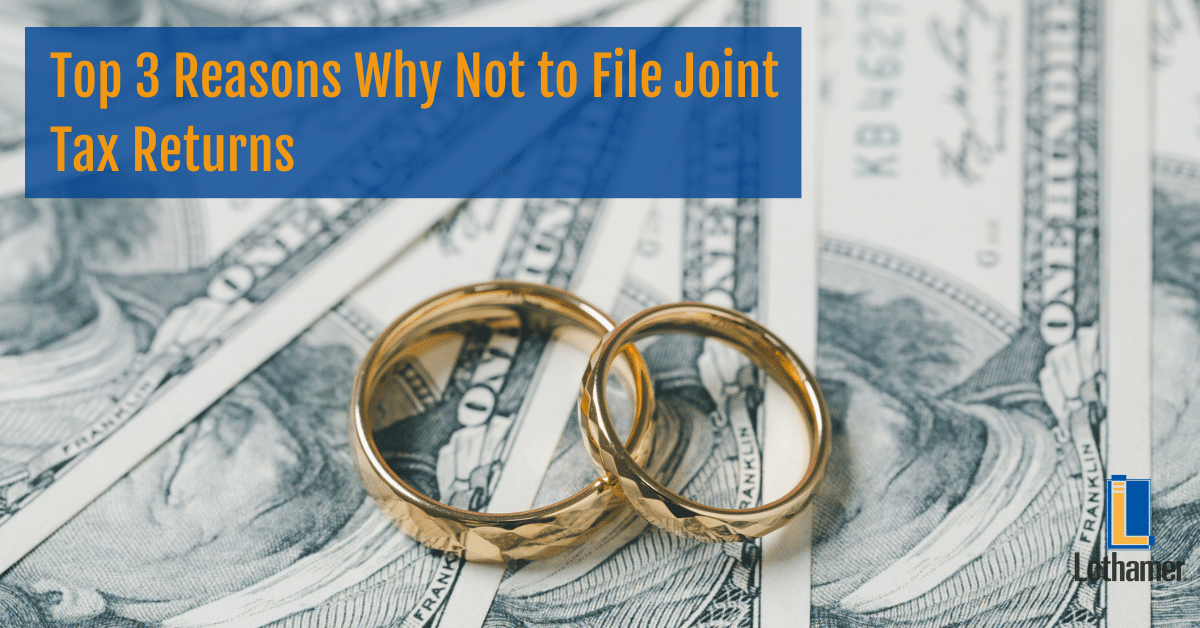
Marriage is a beautiful thing. It’s a time of joining families, homes, bloodlines, and, perhaps less romantically, tax returns. But many people don’t realize that when you get married, you don’t have to choose the married filing jointly route. Despite the fact that married couples do qualify for many tax benefits, there are some situations where married filing separately makes more sense—and can ultimately protect your spouse from potentially devastating tax debt.
At Lothamer Tax Resolution, we’ve counseled many couples financially when it comes time to solve their tax problems for good. We’re here to cover some of the main circumstances when couples should carefully consider married filing jointly vs. separately.
When Should Married Couples Not File Jointly?
When One Spouse Struggles with Student Loan Debt
Income-based student debt repayment plans are calculated based on the income you report on your tax return. If you file jointly, those payment plans will be calculated on both of your incomes combined—even if only one of you is responsible for the debt.
There are some additional considerations to make here, however. While you may be able to lower your overall monthly repayment amount by filing separately, you’ll also lose out on many tax exemptions, deductions, incentives, and credits. So, your overall costs may outweigh the savings in the long run.
To find out if filing separately will be better for your financial situation, speak to a licensed tax professional.
When One Spouse is Self-Employed or Has Many Itemized Deductions
In situations where one spouse earns significantly more than the other, or where one can claim more itemized deductions, filing separately may be in your best interest. This may be especially helpful if you don’t have children, or if one spouse has had major out-of-pocket medical expenses in this tax year.
If you are an independent contractor with significant deductions, it may be worth considering separate filing status to maximize your benefits. This also brings us to the next topic—if you’re an independent contractor who can’t pay what you owe or hasn’t filed your returns in some time, you’ll absolutely want to seek the help of a tax resolution professional BEFORE you file.
When One Spouse is Dealing with a Significant Tax Liability Issue
The number one reason to file separately instead of jointly is when one spouse has a tax problem. By filing jointly, you take joint responsibility for any back taxes owed, as well as all accumulated interest and penalties.
And while there is such a thing as innocent spouse relief, it is not applicable to all tax problems. If your spouse failed to report a source of income or underreported the amount they made without your knowledge, you may be eligible. But if they owe significant back taxes when you get married, can’t pay what they owe, or have years of unfiled returns, this relief may not be available to you, leaving you holding the bag for tens of thousands of dollars.
Lothamer Case Study: A Cautionary Tale Against Married Filing Jointly Status
Recently, a married couple came to us with tax returns that had already been prepared and filed as married filing jointly, and the returns showed large tax balances owed. On review of the returns, our team discovered that the husband’s activities alone had caused the debt.
However, because the returns were filed jointly, they could not be amended. Additionally, both husband and wife were jointly liable for the full amounts owed in taxes. Joint liability means that each party is on the hook for the full amount. Three months after the returns were filed, the husband passed away, leaving the wife solely responsible for the large tax balance—and any tax liens that came with it.
Lothamer Case Study: Why to Consult with a Tax Professional
Another married couple came to us for tax return preparation several years ago. The husband was an independent contractor, but he had many years of unfiled tax returns. Now that the couple were approaching retirement age, he had to get current to get his social security benefits. But of course, he owed an extremely large tax debt.
We counseled the couple and recommended that they file separate returns—even though it would cause slightly higher balances—so that all of the tax balances would fall on the husband and none on the wife. The couple agreed and the returns were prepared and filed as married filing separate.
A few years after the returns were filed, the husband unexpectedly passed away. In this scenario, because the wife filed separate returns from her husband, she was not jointly liable for her husband’s large tax debt. Because she didn’t have to worry about repaying the IRS, she could focus instead on the personal things that mattered most.
Get Professional Advice About Married Filing Jointly vs. Separately
We recommend that anyone dealing with a significant tax burden speak to the team at Lothamer. If you know that you have years of unfiled tax returns or can’t pay the taxes you owe, you need to speak to a member of our team as soon as possible to develop an optimized Roadmap to Resolution.
It’s critical to be proactive about these matters, as you may end up passing on the burden of your tax obligations to your spouse or children. Remember, a married filing separate return can be amended to married filing joint within certain time limits, but a married filing joint return can never be amended to a married filing separate status. If you’re soon to be wed and you don’t want to burden your new partner with the tax problems of your past, there is hope—the sooner you act, the better!
Lothamer Tax Resolution: Same-Day Tax Help Throughout the Midwest
Lothamer Tax Resolution is ready to help individuals and couples with significant tax issues in Michigan, Indiana, Illinois, and Wisconsin. We’re prepared to take immediate action with the IRS to protect you and your family and get you on your own personalized path to resolution. We have the People + Technology to optimize your chances of success. Call (877) 829-2455 to find your nearest CPA, tax attorney, or enrolled agent, or contact us online to solidify your financial future today!
"*" indicates required fields




